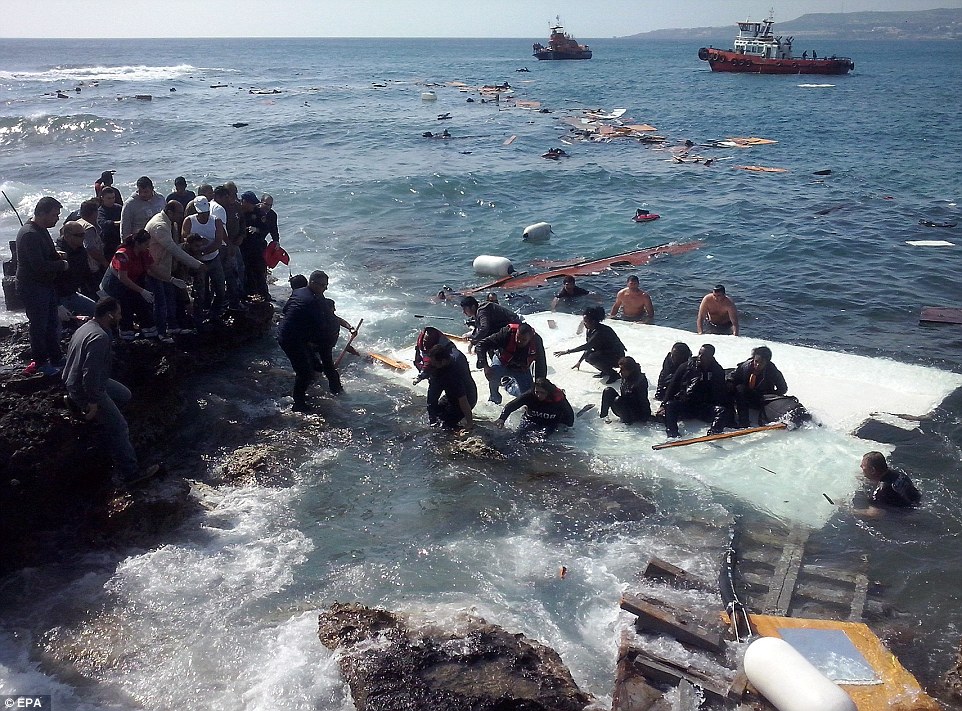Since January 2015 at least 1,550 people have died in their attempt to cross the Mediterranean, in search of safety or a better life. Just a few months ago (October 2014), the search and rescue operation Mare Nostrum, with a budget of 9 million euros a month, was succeeded by operation Triton, carried out by Frontex, with a budget of only 3 million euros a month. After the last weeks of shipwrecks, the overall death toll has now increased and will continue to rise if proper responsibility and action is not taken by the EU and its Member States. In addition, action is needed by a number of states on the African continent and in the Middle East and their relevant international organisations.
Following this week’s disaster, the European Union’s Joint Foreign Affairs and Home Council has proposed a 10-point action plan on migration. ENNHRI takes note of this effort and acknowledges that some measures go in the right direction, including the strengthening of the joint operations in the Mediterranean, or rethinking emergency relocation mechanisms and resettlement engagements.
Nevertheless, as long as the emphasis remains on external border protection and fighting smugglers, the tragedies will continue. From 600 deaths in 2013, 3,500 in 2014 to now more than 1,550 in the first quarter of 2015, we may conclude that the EU has not adequately addressed one of the root causes of the problem: the scarcity of legal channels to Europe. Human smugglers thrive when people in need of protection or in search of a life of dignity have to resort to irregular migration channels. Fighting human smuggling should remain a priority, but focusing on the abusive and exploitative networks that make a livelihood from smuggling risks sidelining the fundamental rights of migrants attempting this treacherous journey.
The Universal Declaration of Human Rights prescribes that everyone has the right to leave any country, including their own and the right to seek and enjoy asylum in other countries. This right to asylum is also enshrined in Article 18 of the EU Charter of Fundamental Rights. The UN Convention relating to the status of Refugees contains the principle of non-refoulement. As such, the obligation to uphold these rights needs to be respected by the EU and its Member States. Following the Hirsi Jamaa judgement of the European Court of Human Rights, it is undisputable that Member States should uphold their human rights obligations in high sea rescue operations.
By refusing people to pass the European border, if they reach the border at all, it is impossible to investigate thoroughly a migrant’s claim to protection. This could result in individuals being sent back who may await ill-treatment in the receiving country or persecution in the receiving country, in the current context, mainly Somalia, Syria, Eritrea, and Sudan.
How can the EU prevent more tragedies? Options are numerous. In line with the Fundamental Rights Agency, ENNHRI recommends that member States should increase pledges for resettlement and humanitarian admissions, with financial support from the EU.
Ways of expanding legal avenues to reach the EU should be explored by building upon previous experiences, such as the humanitarian evacuation programmes developed during the Kosovo crisis. The activation of the 2001/55/EC directive on temporary protection in the event of a mass influx of displaced persons could also present a serious option.
More immediately, a solution to the smuggling problem can also be found in the possibility to issue short-term visas on humanitarian grounds. The humanitarian visa procedures are different from resettlement or other forms of humanitarian admissions, as only an initial assessment is conducted extraterritorially. Member States can also take immediate action by broadly applying rules on family reunification for people in need of protection. Member States should not only contribute to an overall EU action – including the development of new legal avenues – but should use their margin of appreciation in migration matters, as allowed by their national laws.
Moreover, this dramatic situation reminds us of the need for greater solidarity from those Member States less affected. The Dublin system is incompatible with fundamental European and international human rights standards, as continually highlighted by European and international bodies, institutions and UN special procedures mandate holders, who stress its adverse effects on both migrants and South European countries – the ‘gatekeepers of the Union’ – and the urgent need for a flexible implementation and a review of this system.
ENNHRI acknowledges that long-term solutions will require action from many regions across the globe, and concerted effort by a variety of actors to address the root causes of the mass exodus of individuals from various regions to seek asylum elsewhere. ENNHRI calls on all states to contribute proportionately to sustainable development and the realisation of all human rights – civil, political, economic, social and cultural – including in those regions of forced migration as well as within Europe itself.
At the same time, ENNHRI underlines the need for urgent action to address the current humanitarian crisis on Europe’s southern Coasts. ENNHRI, and its Asylum and Migration Working Group, calls on the EU institutions and Member States to take immediate action, focused on the protection of human beings, and not solely on the protection of the external borders. ENNHRI calls upon EU Member States to address the current humanitarian crisis in accordance with international human rights.


